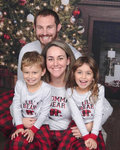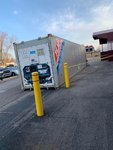Cloudy, 56° F
Describing COVID-19’s impact on Detroit as “horror,” Bart Doyle doesn’t want his hometown of Powell to be hit by the coronavirus.
“It would be beyond devastating to …
This item is available in full to subscribers.
The Powell Tribune has expanded its online content. To continue reading, you will need to either log in to your subscriber account, or purchase a subscription.
If you are a current print subscriber, you can set up a free web account by clicking here.
If you already have a web account, but need to reset it, you can do so by clicking here.
If you would like to purchase a subscription click here.
Please log in to continue |
|



Describing COVID-19’s impact on Detroit as “horror,” Bart Doyle doesn’t want his hometown of Powell to be hit by the coronavirus.
“It would be beyond devastating to see something like this happen in Powell, or anywhere in the great state of Wyoming for that matter,” he said in an email to the Tribune.
The 31-year-old doctor described what he’s seeing in Detroit as “incredibly painful.”
“There are refrigerated units behind all of the hospitals to hold the dead bodies because the hospital morgues, city morgues, funeral homes and crematoriums don’t have room for them,” he said.
After New York City, the Detroit area has the most deaths related to COVID-19 in America. Statewide, Michigan had 32,000 confirmed cases and 2,468 deaths as of Monday.
“So far, we have had to contend with hospitals that are maxed out on space, and have gone above and beyond to expand their capacity for both critical and non-critical patient care,” Doyle said.
Hospitals also are dealing with inadequate staffing and lack of personal protective equipment (PPE) and medical devices.
“There have been times when there weren’t enough ventilators and decisions had to be made about who would get them based on their chances of survival,” Doyle said.
Since no visitors are allowed, doctors and nurses have used their own cellphones to call patients’ families on FaceTime so they can see loved ones before they’re placed on a ventilator, in case they don’t survive.
“This virus is real and it can be very deadly,” he said. “The media is not just ‘trying to scare you.’”
Doyle graduated from Powell High School in 2007 and Northwest College in 2009; he then did his undergrad at Liberty University and went on to medical school at Virginia Tech.
Doyle said he’s now seeing things he never expected in America.
“This is the sort of thing hospital administrations and governments have nightmares about and hope never happens,” he said. “Sure, they have prepared for it on some level, but never to this extent.”
Doyle said that more than likely, most people in Powell won’t get the new virus, “but you can make sure that doesn’t happen by simply doing what is asked of you.”
Measures to combat COVID-19 aren’t about the government taking away rights, Doyle said.
“... It’s your elected officials asking you to protect yourselves and your neighbors from this virus,” he said. “Do not call anyone working in health care a ‘hero’ if you are going to turn around and selfishly defy the social distancing measures. It will only bring more harm and hurt to the situation.”
Heeding the call
Doyle is an OBGYN, and his wife, Stephanie, is a pediatric critical care nurse.
“While we are both in the hospital every day and are exposed to the virus, we don’t have to spend 12-plus hours under PPE in direct contact with those infected by the virus,” he said.
Still, the new coronavirus has significantly changed his work. In addition to the regular sterile gown and gloves for deliveries, Doyle now wears full PPE — a droplet gown, N95 mask, another mask over the N95, a full face shield and hair net.
Patients in labor are only allowed one visitor for their entire hospital stay.
“Both patient and visitor have to wear a mask at all times, even during delivery,” Doyle said. “It really takes the personal nature of the experience out of it when you can’t see facial expressions.”
Moms who test positive for COVID-19 or are suspected to be positive are separated from their baby at birth to attempt to keep the infant from getting the virus, he said, though that decision is left up to the mother.
As both he and his wife work in hospitals, Doyle said they consider themselves “very fortunate,” since they don’t have to spend as much time in the most infectious areas. Stephanie took a position in administration in January “right before all of this hit.”
Still, the couple is exposed and follows a strict cleaning process each night when going home to their two young children.
Shoes stay in a box outside, while scrubs — which are changed before leaving the hospital — are immediately taken to the laundry room. Wallets/keys/phones/watches are all sanitized, and then it’s straight to the shower.
Doyle’s sister, Kelly, a 2008 PHS grad, is an ICU nurse in Virginia and follows a similar routine.
“She currently cares for COVID only patients and has more exposure than I do on a daily basis,” Doyle said. “She’s an excellent nurse and as brave as they come.”
He described health care as a calling.
“... So we tighten our belts and we still go to work and hope to save as many lives as we can, because that’s what we were called to do,” Doyle said.
He commended his colleagues — physicians, nurse anesthetists, assistants, respiratory therapists, nurses, etc. — who have done “extraordinary things.”
“Everyone is scared, burnt out and tired,” Doyle said.
Some medical workers have stayed away from their own families for weeks.
“... they are doing what they can to protect them while still heeding the call of this profession and uphold the oaths they took. It’s pure guts, and they are amazing,” Doyle said.
Last week, he said it felt like Detroit was “finally starting to reach that ‘peak in the curve.’”
“Unfortunately, the peak for COVID related deaths has been about seven to 10 days behind the infection curve, so we are still seeing a significant number of deaths associated with this virus,” he said. “Hopefully, this will be the worst few days.”
‘America at its best and its worst’
Doyle has seen his community rally and support one another amid the pandemic.
“Outside of the hospital I’ve seen America at its best and its worst,” he said. “Even in a city like Detroit that has a pretty rough reputation, the sense of community that most people have shown is incredible.”
Thanks to local support, restaurants offering curbside pick-up and delivery have managed to stay afloat. Churches, food pantries and soup kitchens have helped those struggling from not being able to work, Doyle said.
Hospitals have received an outpouring of needed PPE and other supplies. Staff in emergency departments and ICUs have been fed daily by local restaurants, funded by donations, he said.
“Despite the dire situation and general horror everyone is having to go through, it’s really been a light in the darkness to see everyone showing so much love to their neighbors,” Doyle said.
But he also has been frustrated by what he’s seen.
“At the same time, there remains a decent number of incredibly selfish and narrow-minded people that do nothing but complain about being controlled by the government and having their rights taken away for ‘a stupid virus that probably won’t even make me sick,’” Doyle said.
Some have refused to abide by the shelter-in-place order, he said. Thousands gathered outside the State Capitol in Lansing, Michigan, last week to protest the order.
“They put themselves and everyone around them at risk, and likely brought significant harm to a process that was finally starting to make a difference in this fight,” Doyle said. “It was very demoralizing as a provider to know there are people that are that selfish, despite having to see what is going on around them.”
Doyle said health care workers aren’t the frontlines — the public is. He urged people to follow the restrictions currently in place, help one another and temporarily make due.
“Be glad you live in Wyoming, and please, DO YOUR PART to keep the COVID-19 numbers low so you can go back to enjoy the great way of life that you have,” Doyle said.